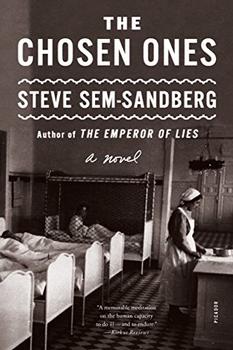Summary | Excerpt | Reviews | Readalikes | Genres & Themes | Author Bio

A Novel
by Steve Sem-Sandberg
The River Adrian would sum up his early childhood as hardly the happiest years of his life, but at least a time he could look back on without feeling ashamed. He used to spend his summers with his favourite uncle, one of his mother's younger brothers who lived out in Kaisermühlen. His real name was Ferenc Dobrosch, though his sister called him Franz. At the time, Adrian and his siblings had the surname Dobrosch, because their mother wasn't married to their father. Ferenc said that that Dobrosch was a Hungarian surname even though it didn't sound the slightest bit Hungarian, and explained that the entire family came from a couple of small villages in a part of Hungary that now belonged to Slovakia. Adrian's mother insisted that the family name was Slovakian and in no way Hungarian, not that it mattered since it was just as good as any Austrian name because all names are fine in Austria, or had been in the old days. Uncle Ferenc had no education to speak of but was a hard-working and enterprising man who earned a living from occasional jobs that he seemed to pick up easily, or at least he did back then. During the summer, he minded the animals down on the allotments at Hubertusdamm, where many of the plot-holders used to keep cows or goats on the old floodplain between the high-water dam and the river. Adrian and his little brother Helmut helped to feed the animals and were rewarded with a churn full of fresh milk to take home. The animals were calm and warm. If it rained, they would stand close to each other, as if asleep. Ferenc and Adrian lay on their backs on the ground. It was covered in animal dung and rubbish like old tyres and nails from the workshops along the road, so if you were running around barefoot you had to look out or you might get hurt. The air was moist after the rain, the summer sky high and bright. Dense insect swarms rose like pillars above the puddles in the river mud. Ferenc wore an old suit jacket and a beret, but had nothing on under the jacket. His hairy, sun-scorched chest was dotted with red insect bites and he would squeeze the worst ones with his hard nails, then suck the blood from his fingers. It didn't hurt one bit, he said. Sometimes, he taught them things. How to cheat hunger by chewing grass, for instance. Lying there, looking out over the river, Ferenc said that the river was a curse on the land. Once, Kaisermühlen had been one of the numbered city districts – it was the 2nd Bezirk – and the local farmers had come here to have their grain ground to flour in the water-powered mills. Then the emperor ordered dams to be built across the old branching creeks of the river to direct the flow through a new main channel dug along a line that changed the relationship of the land to the river. For instance, what had been the left bank of the Donau ended up on the right, cut off from everywhere else by the river. From then on, Kaisermühlen was changed by word of mouth into Hunger Island. People would come looking for work but never managed to cross the river. The same thing happened when they dug the Panama Canal, Ferenc said. And then, as now, many of the labourers had drowned. Adrian asked if he knew anyone who had been a navvy on the river channel but no, Ferenc had been too young at the time, though he had heard that relatives on his father's side had worked there. They mostly took on foreign labour, though, because the work was so dangerous. The men had died from typhus or were carried off by the river and surfaced months or even years later, so you never knew who they were or where they came from. Adrian liked the river, especially on clear days after rain, with open sightlines in every direction that meant you could see faraway places like Kahlenberg and the Reichsbrücke and the tower of the Kaiser Jubiläumskirche in Leopoldstadt. He also liked to watch the river, the controlled but irresistible power of the flowing water, and the way it and the sky exchanged light, so that the river looked different from one hour to the next. At dawn, the wind would raise ripples across the mass of water which later, at dusk, could be so still and translucent it seemed you might walk on its glassy surface. This was when they would set out for the walk back home, Ferenc in front carrying the milk churn, followed first by Adrian and then his little brother. Helmut was only three and it was hard for him to keep up. He was a slight, blue-eyed boy with a shock of blond hair. Seeing him, no one thought that this little boy could be Eugen Ziegler's child, not even Ziegler himself, who accused the mother of having produced this Dobrosch offspring with another man. All the same, Adrian, who shared his life with his younger brother, thought Helmut's ingratiating smile and the unconcerned look in his eyes made him a dead ringer for their father. The boys walked barefoot because their mother thought it was silly to wear shoes when it wasn't necessary.
Excerpted from The Chosen Ones by Steve Sem-Sandberg. Copyright © 2016 by Steve Sem-Sandberg. Excerpted by permission of Farrar, Straus & Giroux. All rights reserved. No part of this excerpt may be reproduced or reprinted without permission in writing from the publisher.
Your guide toexceptional books
BookBrowse seeks out and recommends the best in contemporary fiction and nonfiction—books that not only engage and entertain but also deepen our understanding of ourselves and the world around us.